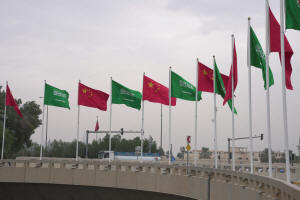China's Xi arrives in Saudi on 'epoch-making' visit to deepen economic
and strategic ties
 Send a link to a friend
Send a link to a friend
 [December 07, 2022]
By Aziz El Yaakoubi and Eduardo Baptista [December 07, 2022]
By Aziz El Yaakoubi and Eduardo Baptista
RIYADH (Reuters) -President Xi Jinping arrived in Saudi Arabia on
Wednesday, Chinese state media said, on a visit Beijing hailed as its
biggest diplomatic initiative in the Arab world, as Riyadh expands
global alliances beyond longstanding ties with the West.
The meeting between the global economic powerhouse and Gulf energy giant
comes as Saudi ties with Washington are strained by U.S. criticism of
Riyadh's human rights record and Saudi support for oil output curbs
before the November midterm elections.
Crown Prince Mohammed bin Salman is expected to offer Xi a lavish
welcome, in contrast with the low-key reception for U.S. President Joe
Biden whose censure of Saudi Arabia's de facto ruler formed the backdrop
for a strained meeting in July.
Xi's trip includes direct talks with Saudi Arabia, a wider meeting with
the six-nation Gulf Arab alliance and a summit with Arab leaders which
will be "an epoch-making milestone in the history of the development of
China-Arab relations", foreign ministry spokesperson Mao Ning said.
Beijing hopes it will make a strong statement on strengthening "unity
and cooperation", Mao added.

For Saudi Arabia, frustrated by what it sees as Washington's gradual
disengagement from the Middle East and a slow erosion of its security
guarantees, China offers an opportunity for economic gains without the
tensions which have come to cloud the U.S. relationship.
"Beijing does not burden its partners with demands or political
expectations and refrains from interfering in their internal affairs,"
Saudi columnist Abdulrahman Al-Rashed wrote in the Saudi-owned Asharq
Al-Awsat newspaper.
Unlike Washington, Beijing retains good ties with Riyadh's regional
rival Iran, another supplier of oil to China, and has shown little
interest in addressing Saudi political or security concerns in the
region.
[to top of second column]
|

Flags of participating countries are
pictured ahead of the China-Arab summit in Riyadh, Saudi Arabia,
December 7, 2022. REUTERS/Mohammed Benmansour

Growing Chinese influence in the Middle East has unnerved the United
States, for which the Asian giant is an economic rival.
The Chinese delegation is expected to sign deals this week worth $30
billion with Riyadh, Saudi state news agency SPA said, as well as
agreements with other Arab states.
China, the world's biggest energy consumer, is a major trade partner
of Gulf oil and gas producers. Saudi Arabia is its top oil supplier
and state-run Saudi Aramco has annual supply deals with half a dozen
Chinese refiners.
While economic ties remain anchored by energy interests, bilateral
ties have expanded under the Gulf's infrastructure and technology
push, part of diversification plans that have gained importance as
the world turns away from fossil fuels.
Saudi Arabia and its Gulf allies have said they would continue to
expand partnerships to serve economic and security interests,
despite U.S. reservations about their ties with both Russia and
China.
The United States, which for decades has been Saudi Arabia's main
security guarantor and remains its main defence supplier, has
expressed security concerns about growing Chinese involvement in
sensitive infrastructure projects in the Gulf.
(Reporting by Eduardo Baptista in Beijing and Aziz El Yaakoubi in
Riyadh; Additional reporting by Ghaida Ghantous in Dubai; Writing by
Dominic Evans; Editing by Nick Macfie and Toby Chopra)
[© 2022 Thomson Reuters. All rights
reserved.]
This material may not be published,
broadcast, rewritten or redistributed.
Thompson Reuters is solely responsible for this content.
 |